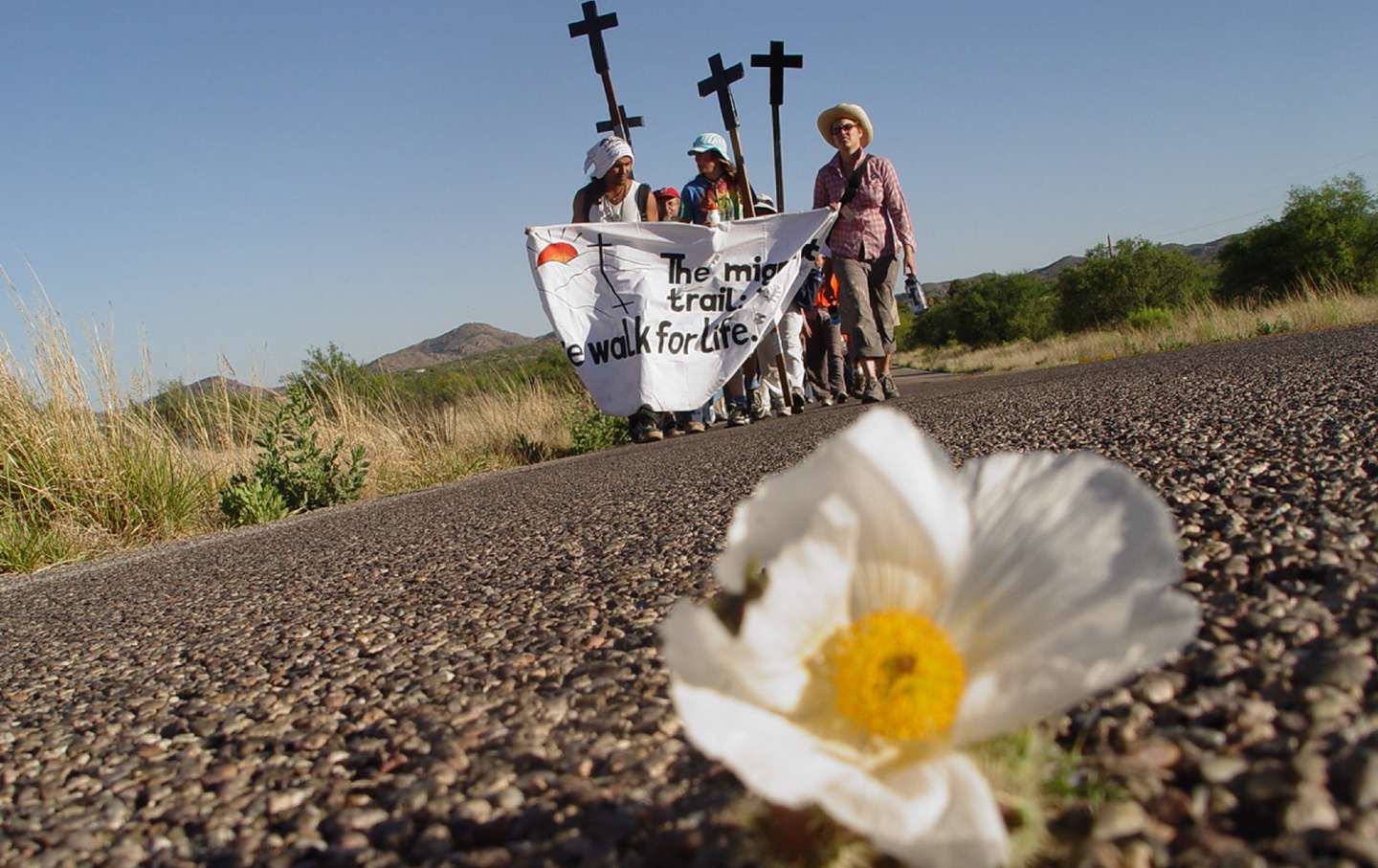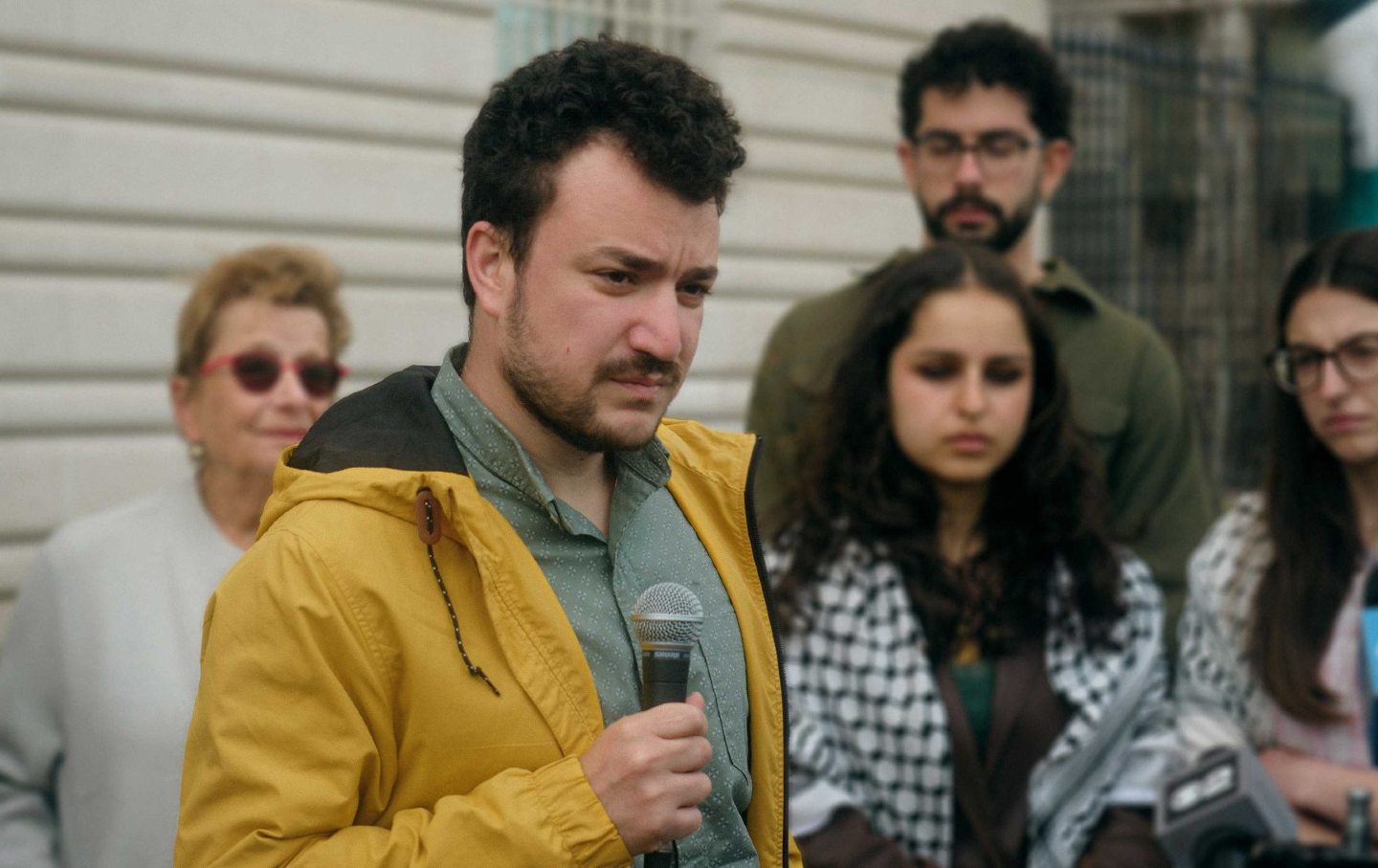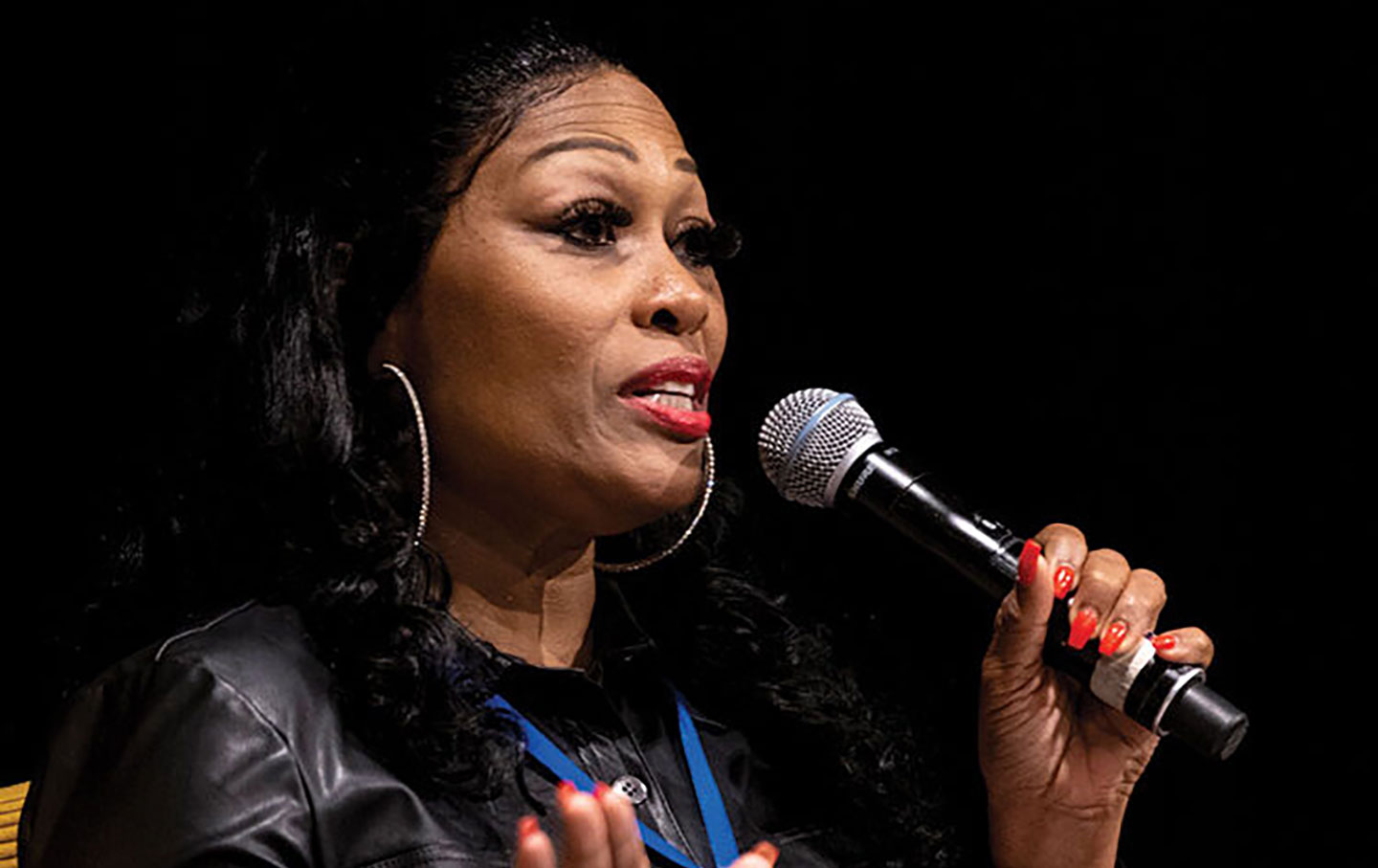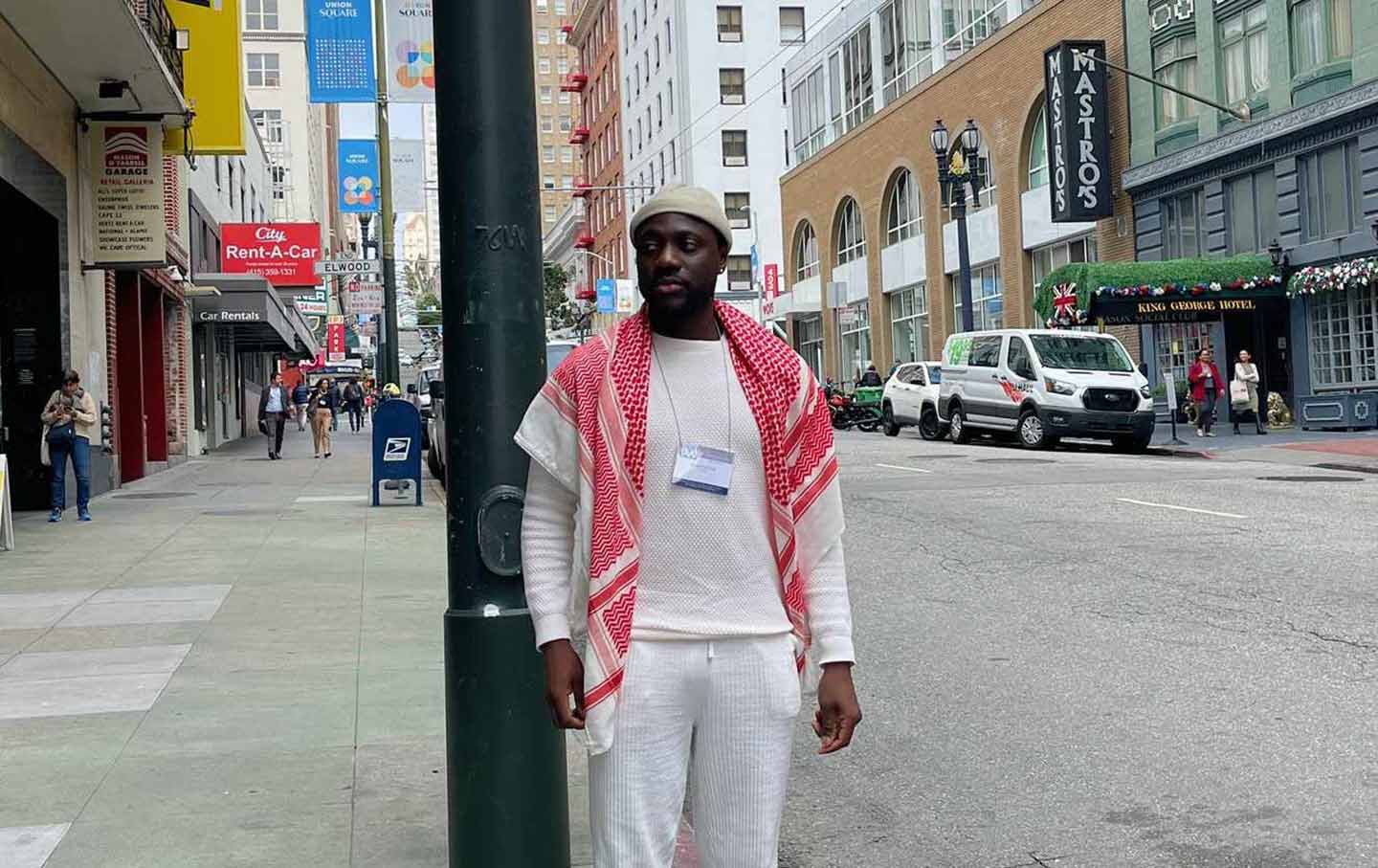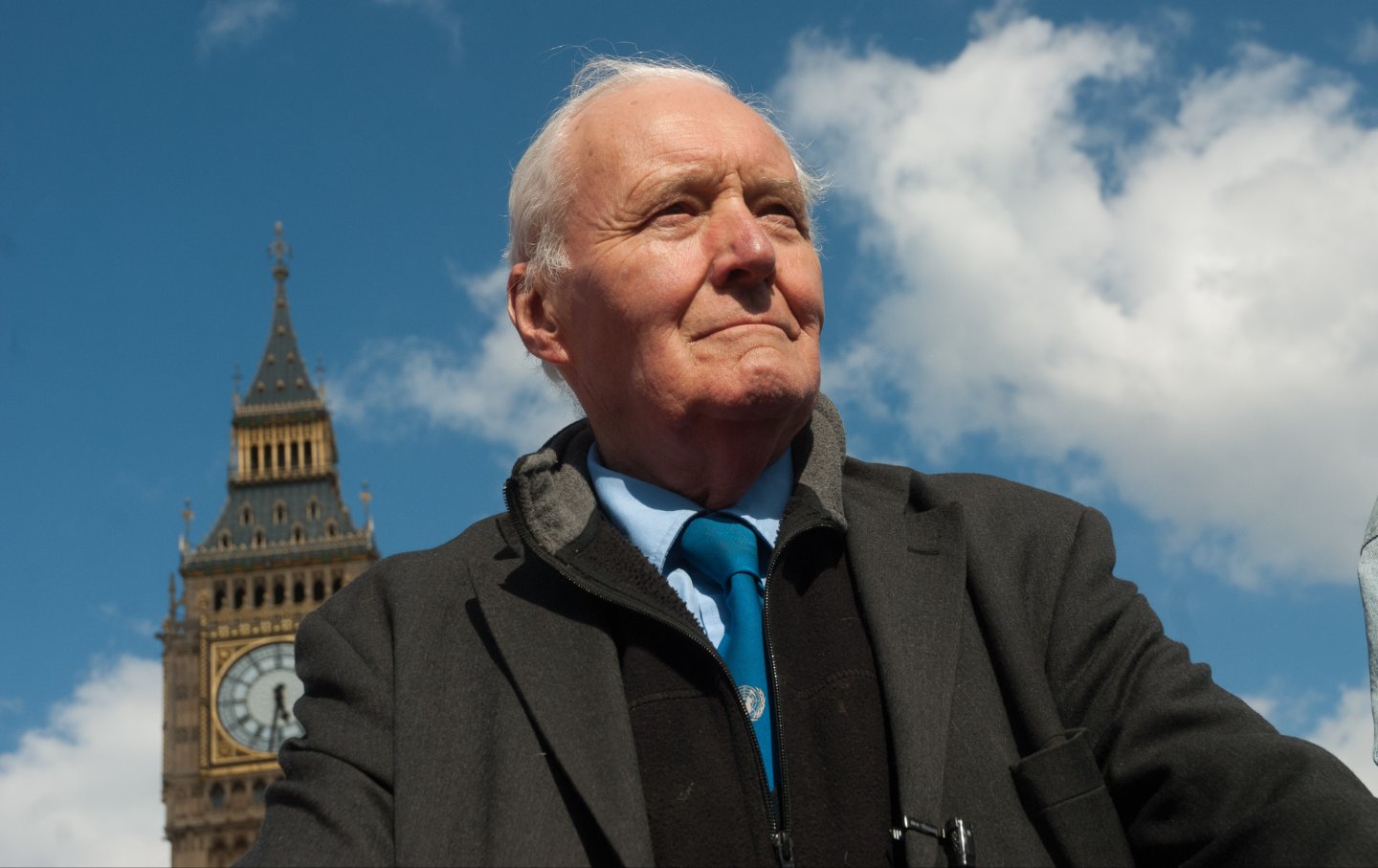“They Will Not Erase Us”: The Scene on Capitol Hill During Netanyahu’s Address
The Israeli prime minister rebuked criticism during his speech to Congress, but not without protests from lawmakers, staff, congressional interns, and thousands of others.
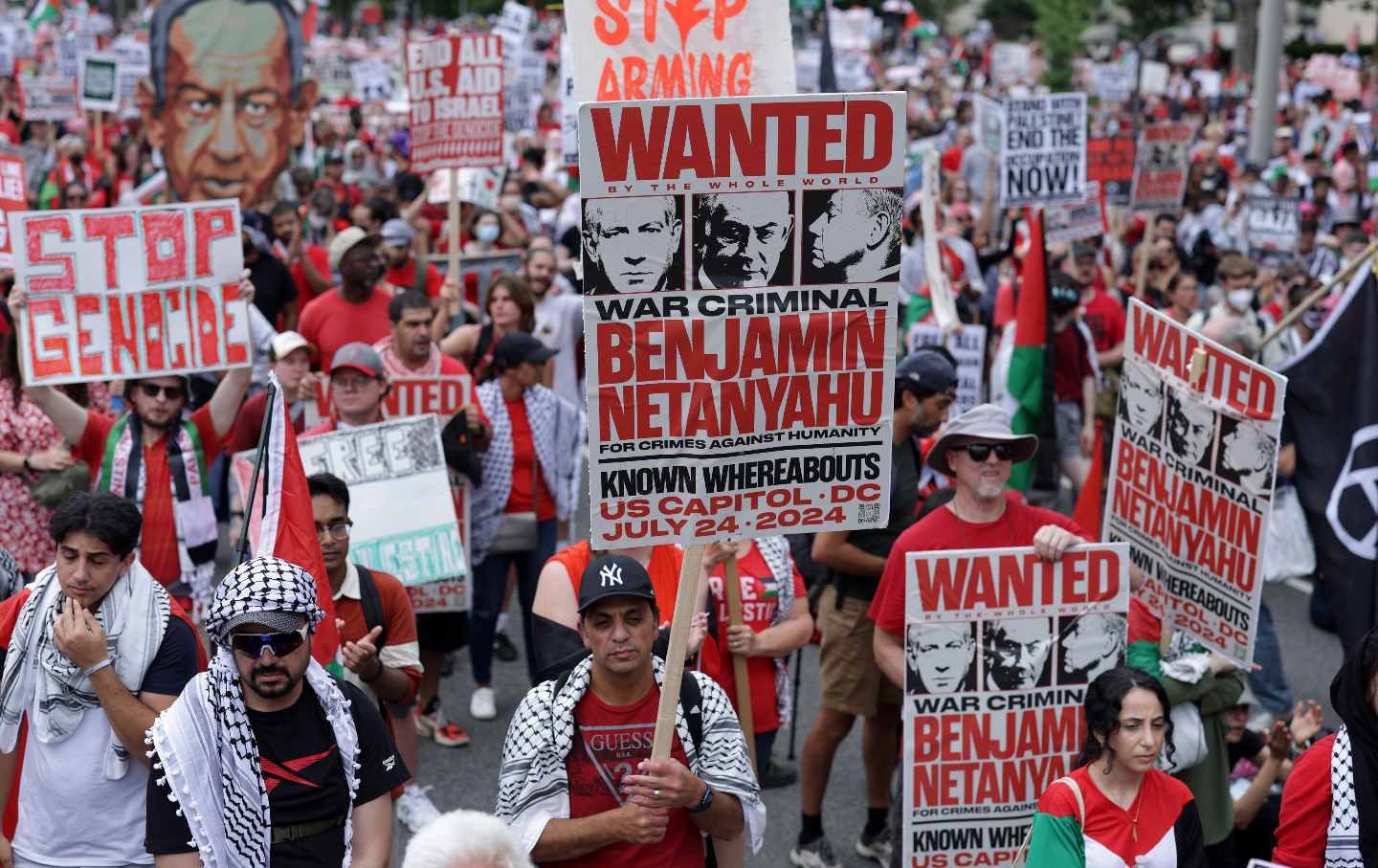
Activists participate in a pro-Palestinian protest near the US Capitol on July 24, 2024, in Washington, DC.
(Alex Wong / Getty)
As Washington, DC, grapples with one of the most chaotic months in American politics, Israeli Prime Minister Benjamin Netanyahu visited the nation’s capital Wednesday to deliver an address to Congress that only fanned the flames.
During his speech, Netanyahu attacked his critics, brushed off condemnations over his handling of the military operations in Gaza, and focused on the threat Iran poses to Israel. The Capitol complex, usually bustling with tourists and sightseers eager to snap a picture with the iconic dome, was empty. Large, black metal fencing encompassed the Capitol itself with smaller metal barricades blocking entrances to surrounding office buildings. The increased presence of Capitol Police was evident. The Capitol Visitor Center was closed and public tours were not operating.
But this did not stop a multitude of demonstrations from objecting to Netanyahu’s invitation to address Congress.
At least 44 House Democrats and 11 Senate Democrats boycotted the address. Among those refusing to attend were progressive left-wing members but also some establishment figures, including former House speaker Nancy Pelosi. In lieu of the address, many of them attended a meeting with family members of hostages taken by Hamas during their October 7 attack on Israel. Almost all of them cited personal issues with Netanyahu himself for not attending.
Representative Alexandria Ocasio-Cortez said that she would not be attending, calling Netanyahu “an authoritarian with warrant requests from the International Criminal Court.” Representative Sara Jacobs, the youngest Jewish member of Congress, drew upon her religion by saying, “It is because of my Jewish upbringing and values that I can’t attend Prime Minister Netanyahu’s address,” specifically referencing “Jews’ sacred task of tikkun olam—to repair the world.” One member, Representative Ilhan Omar, gave her tickets to the speech to a family member of an Israeli hostage, since “Netanyahu has actively sabotaged hostage deals.”
One notable exception was Representative Rashida Tlaib—the only Palestinian member of Congress—who opted to attend the speech and hold up a sign that said “war criminal” during Netanyahu’s address. “They will not erase us,” Tlaib wrote in a statement. “Palestinians exist and we deserve to live. Our presence today will be a reminder that we aren’t going anywhere.” As her guest, Tlaib invited Hani Almadhoun who has lost 150 members of his extended family in Israel’s military campaign and started a soup kitchen to feed his neighbors.
Slightly outside of the chamber, but still within the Capitol complex, others expressed their disapproval. The Congressional Progressive Staff Association participated in a “walkout against war crimes” to protest the prime minister’s visit. A group of 84 congressional interns from 41 offices signed a letter pledging to miss work to pressure their offices “to respond to the collective will of the American people and reject any semblance of endorsement for Netanyahu’s actions,” according to a statement provided to The Nation.
Outside of both the chamber and the Capitol complex, thousands joined to protest Netanyahu’s visit. Clad in red and carrying Palestinian flags, they marched around the Capitol to express their disapproval of the prime minister. Hundreds arrived in DC via organized group bus rides from cities across the eastern seaboard.
The protests were peaceful, barring a few isolated incidents. At one point, US Capitol Police deployed tear gas and flash bangs, saying the “crowd failed to obey our order to move back from our police line.” There were a few scuffles between anti-Netanyahu and pro-Israel protesters. Perhaps the most widely shared moment came when a group of protesters took down multiple American flags outside DC’s Union Station, burned them on the ground, and replaced several of them with Palestinian flags. (Later that night, a group of GOP members and House Speaker Mike Johnson visited Union Station to raise an American flag to its original spot and recite the Pledge of Allegiance.) Some participated in burning a papier-mâché depiction of Netanyahu with a US missile protruding from his crotch. Others carried the flag of Hamas. Statues in front of the hall were spray painted, with one reading “Hamas is comin’.”
The scenes from these disruptive actions quickly circulated on social media, promoted by Republican members of Congress with captions condemning Democrats for not doing enough to suppress these actions.
Protests like these were a focal point of Netanyahu’s address. Alleging that the pro-Palestinian protests that have cropped up on college campuses nationwide were funded by Iran, he labeled these protesters as “Iran’s useful idiots.”
“Netanyahu, himself a product of US higher education, is desperate to silence the overwhelming consensus in support of Palestinian liberation on US college campuses,” Students for Justice in Palestine (SJP) said in a statement to The Nation. Chapters of SJP nationwide were driving forces behind the pro-Palestine encampments on dozens of college campuses nationwide. “Zionism has lost the narrative battle on campus, and in a last-ditch effort to salvage its dwindling influence, the Zionist lobby has resorted to lawfare driven by a pathetic hyperfixation on SJP’s funding,” they said.
Noticeably, as he addressed a delegation of America’s top legislators, the crux of Netanyhu’s speech wasn’t on securing a ceasefire deal. Instead, he continued to vow for an absolute annihilation of Hamas through “victory.”
“Israel will fight until we destroy Hamas’s military capabilities, end its rule in Gaza, and bring all our hostages home,” he said. At another point, he implored Congress to “give us the tools we need, and we will finish the job.” In fact, he never explicitly mentioned a ceasefire, only saying “we’re actively engaged in intensive efforts to secure [the hostages’] release.”
Following the speech, Republicans were relatively unified behind their support for Israel, with many praising Netanyahu’s address. “I thought he hit a home run. I think he did exactly what he needed to do,” Speaker Johnson said. “It was a bipartisan speech. I think that’s important.”
Popular
“swipe left below to view more authors”Swipe →Many Democrats, including those in attendance, were cautious in their enthusiasm. Representative Salud Carbajal described the session as going “far beyond that shared commitment in ways that were detrimental to our chance of securing a lasting peace.” Representative Jimmy Gomez called on Netanyahu to resign. Pelosi dubbed it “the worst presentation of any foreign dignitary invited and honored with the privilege of addressing the Congress of the United States.” The caucus emerged, however, with near-unanimous support for maintaining relations with Israel.

